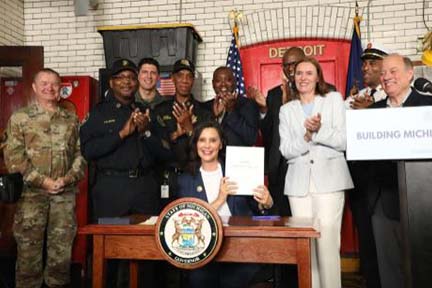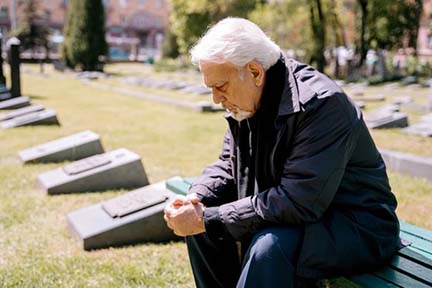
Governor Whitmer Signs Balanced, Bipartisan FY25 Budget
Budget will protect public safety, bring jobs and supply chains home, build affordable housing, fix the damn roads, improve public health, and deliver on range of kitchen-table issues
LANSING, Mich. — Governor Gretchen Whitmer today signed into law a balanced, bipartisan fiscal year 2025 budget to protect public safety, build affordable housing, and help more workers “make it” in Michigan.
“Today’s balanced budget prioritizes public safety, infrastructure, and Michigan workers without raising taxes by a dime,” said Governor Whitmer. “Together, we will hire, train, and retain more first responders, keep fixing the damn roads, compete to bring manufacturing plants back home, put workers on paths to better-paying jobs, and build a heck of a lot more housing. Let’s keep getting things done that make a real difference in people’s lives and ensuring everyone can ‘make it’ in Michigan.”
“Our sixth balanced, bipartisan, fiscally responsible budget builds on the work we have done to help more individuals and families be their best selves and reach their full potential right here in Michigan,” said Lt. Governor Garlin Gilchrist II. “It makes strong investments in students and teachers, business owners, infrastructure, affordable housing, climate resilience, health equity, and more. Whether you are a parent raising a family or an innovator pursuing your next idea, you are welcome in Michigan. Governor Whitmer and I will continue Standing Tall to help everyone thrive in Michigan.”
The FY25 budget totals $82.5 billion, including a general fund total of $15 billion.
“The state budget is one of the best tools we have at our disposal to elicit the most impactful change for the good of Michigan’s diverse communities — and that’s precisely what we’ve accomplished today with Governor Whitmer’s stamp of approval on this historic budget,” said Senate Majority Leader Winnie Brinks (D-Grand Rapids). “Together, we are leading Michigan to a future full of opportunity and prosperity by delivering an equitable, fiscally sound budget that builds up our state’s families, our economy, our infrastructure, and our communities.”
“The budget represents our core values — lowering costs so families can flourish, keeping residents safe, and creating more affordable housing,” said Speaker of the House Joe Tate (D-Detroit). “Every hometown from Detroit to Grand Rapids to the Upper Peninsula will benefit from tens of millions of dollars to establish a Public Safety Trust Fund, $100 million for innovative housing programs, and tax relief for families and seniors. With the passage of this budget, we are making transformative investments for every main street and every household, and Michigan continues to be on a stronger and brighter path forward. We are making smart and fiscally responsible decisions to deliver for the residents of Michigan and continue our commitment to putting PEOPLE first.”
“This ‘Make it in Michigan’ budget will reduce crime, lower costs for families, and fix our roads and bridges,” said State Budget Director Jen Flood. “The investments in this budget will benefit Michiganders for decades to come, create jobs and power economic development, and build on our record of fiscal responsibility.”
Balancing Michigan’s Budget and Lowering Costs
The budget makes critical investments to ensure Michigan’s budget is balanced and puts money back in people’s pockets, including:
- $50 million deposit into the Budget Stabilization Fund, which will bring the grand total in the rainy day fund to nearly $2.2 billion by the end of FY25.
- $20 million deposit ($10 million in FY25 and $10 million in a FY24 supplemental) into the Disaster and Emergency Contingency Fund to cover current and identified expenses and safeguard against the risks of future disasters.
- $3.3 million to improve turnaround times and public outreach for environmental permitting.
- $3 million to implement the Secure Retirement program to help small businesses provide retirement savings plans to their employees at no cost.
- $500,000 to continue the federal EBT summer food benefit program, which distributes $108 million in federal funds to ensure children have access to nutritional food throughout the summer months, saving families $120 per child.
The budget powers economic development, rebuilds our roads and bridges, builds strong communities, replaces lead pipes and more, including:
- $45.5 million for Talent and Growth to support Michigan’s current and future workforce needs and population growth, including specialized economic assistance to businesses locating or expanding in Michigan to meet their talent and workforce needs, developing customized talent solutions to fill identified talent gaps, and grow Michigan’s population.
- $2.5 million for the Economic and Worker Transition Office and an additional $8.6 million for a pilot fund to aid Michiganders with the transition to electric vehicles and clean energy, and prepare for the jobs of the future.
- $50 million in continued funding for the Revitalization and Placemaking program, including support for a new program to implement transformational public space development projects that will increase the population by creating high-density, high-amenity, walkable, vibrant neighborhoods and business ownership opportunities for locals.
- $100 million to construct more affordable housing, building on the historic $1.4 billion investment to build or rehabilitate almost 10,000 homes and the unprecedented $50 million set aside for housing.
- $3.3 million for the Housing Readiness Incentive Grant Program to provide grants to local communities to cover the costs associated with master plan updates, zoning amendments, and other actions to increase housing supply and affordability.
- $3 million to establish a Farm to Family program, focusing on building agricultural diversity, fueling economic growth in agriculture, increasing food security, providing healthy food options, and cultivating climate resiliency across the industry.
- $500 million in the Strategic Outreach Attraction Reserve fund to attract new manufacturers and industries to Michigan helping to diversify our economy and compete nationally for high-paying jobs.
- $60 million to establish an Innovation Fund to invest in scalable startups and help launch hundreds of new Michigan-based companies, creating thousands of jobs.
- $15 million to build off the iconic Pure Michigan campaign, on top of the $15 million in existing general fund for the program.
- $2.5 million for the Office of Rural Prosperity to expand outreach and grant funding in rural communities throughout the state.
- $75 million in new Revenue Sharing funds to continue support for all cities, villages, townships, and counties across the state, helping them provide services to residents including first responders, transportation, and water infrastructure, as well as placemaking and recreation.
Rebuilding Our Infrastructure
- $150 million to support the reopening of the Palisades Nuclear Facility in Southwest Michigan, protecting 600 high-paying jobs at the plant and 1,100 additional jobs throughout the community while helping Michigan reach its clean energy goal.
- $509.4 million for water infrastructure to fund lead service line replacement and water infrastructure, and climate change mitigation.
- $48.3 million to provide loans and grants to local communities to support projects associated with lead service line replacement.
- $74.5 million of new one-time funding for local roads and bridges and other critical infrastructure projects.
- $247.6 million of new funding to improve state and local roads, highways, and bridges across the state. The FY25 budget includes a total of $4.2 billion for road and bridge construction projects, including $1.7 billion in federal highway aid from the Infrastructure Investment and Jobs Act.
- The new investments in roads and bridges will add to $700 million from the final tranche of Rebuilding Michigan Plan bonds to be issued later this year. Key upcoming Rebuilding Michigan projects include work on I-94 near Detroit Metro Airport, I-696 from Southfield through Warren, and a critical bridge project in Erie Township.
- $75 million of additional funding to support local transit operating expenses, federal transit capital grants, marine passenger services, rail operations and transit capital matching funds.
- $20 million of federal American Recovery Plan funding to support local transit operating expenses.
- $24 million to support new technology and mobility projects, including drone infrastructure projects, e-bike incentives, and an inductive charging pilot project.
- $7.1 million of additional funding for Michigan airports and air service retention and enhancement.
Reducing Crime & Keeping Michigan Healthy
The budget includes funding to keep Michigan families safe and healthy, including:
- $75 million to establish a Public Safety Trust Fund to provide cities, villages, and townships with additional resources for police services and to support community violence intervention efforts.
- $75 million in new Revenue Sharing funds to continue support for all cities, villages, townships, and counties across the state.
- $15 million for capital improvements and infrastructure projects at Selfridge Air National Guard Base.
- Hire and train 120 Michigan State Police troopers, and $5.5 million to support salary and equipment costs of the 145th state police trooper recruit school, anticipated to graduate 50 new troopers this summer.
- $25 million for lifecycle upgrades to the state’s safety communication system, ensuring this critical infrastructure supports state and local emergency personnel.
- $5.4 million to continue implementing improvements based on recommendations of the Task Force on Juvenile Justice Reform.
- $17 million to fund grants for local prosecutors to reduce caseload per attorney in the counties with the highest levels of violent crime.
- $8.8 million to support various investments to increase offender success through education, training, and reentry programs.
- $4.4 million for a new National Guard armory in the Grand Rapids area.
- $1.4 million to protect the State Capitol by increasing MSP’s capacity to safeguard those who work in and visit the Capitol and Heritage Hall.
- $7.8 million for firearm injury and violence prevention grants, and community violence intervention services to reduce gun violence and save lives.
- $3.2 million for disaster recovery in communities affected by natural disasters.
- $161.5 million to establish new Certified Community Behavioral Health Clinics sites across the state to serve as many as 35,000 additional individuals, providing them with behavioral health services.
- $18.1 million in funding to continue the Healthy Moms, Healthy Babies program which helps new and expectant mothers receive the care they need and reduce racial disparities in infant and maternal mortality.
- $37 million in new funding for the Family Independence Program, including the first meaningful change to the FIP payment rate since 1990, and expanded supplemental payments to families with young children.
- $28.7 million to fund a 20-cent an hour raise for direct care workers.
- $2 million to fund sexual assault victim services.
- $40 million for federally qualified health centers and $17.2 million autism Medicaid rate increases.
- $8.1 million for a Medicaid rate increase for private duty nursing services.
- $7 million to provide vaccinations to young children.
- $5.6 million to expand contraceptive coverage and family planning services.
- $20 million to provide new funds to communities that identify innovative approaches to support expectant parents and newborns.
- $1.8 million to ensure children have access to health care through MIChild, saving families $120 a year per child.
- $5 million to help low-income households with pre-weatherization and improve the energy efficiency of their homes, reducing utility bills.
- $7.3 million to ensure individuals experiencing behavioral health crises have access to the Michigan Crisis and Access Line 24 hours a day, seven days a week.
- $2.5 million for smoking cessation and tobacco prevention programs to expand current efforts in addressing tobacco use among Michigan’s adult and youth population.
- $1.5 million to increase the clothing and holiday allowances for children in foster care. This investment is the first increase in state support to foster parents for clothing and holiday presents in over 20 years, increasing the clothing allowance by 40-50% (depending on the child’s age) and tripling the holiday allowance.
- $500,000 for technical assistance and equipment to ensure the water is safe to drink in the state’s child care centers.
- $4 million additional in internet gaming, internet sports betting, and state lottery funds to support Problem Gambling services.
A Fairer and More Equitable Michigan
The budget includes investments that will build a fairer and more equitable Michigan, including:
- $65 million to fund a 15% rate increase for child care and bonuses for child care workers.
- $37.4 million of new funding for local trial courts to support the effective and fair assistance of counsel for indigent criminal defendants across the state. In addition, $1 million of new one-time funding is included for the University of Michigan Law School to support competent legal representation for juvenile defendants in felony cases.
- $18.5 million total to implement recommendations of the Racial Disparities Taskforce, including neighborhood health grants, mobile health units, sickle cell support and more.
- $2.5 million to fund grants to nonprofit organizations to reduce veteran homelessness.
- $5 million to continue the MI Contracting program to assist small and disadvantaged businesses in securing equipment and insurance to help them compete for contracts.
- $2.4 million to make state government more accessible by ensuring information and materials are provided in the languages spoken by Michigan residents.
- $800,000 for state certification, credentialing, and endorsement of approximately 1,000 interpreters serving the deaf, deafblind, and hard of hearing community.
- $1 million for district courts to help individuals regain their driving privileges.


|














